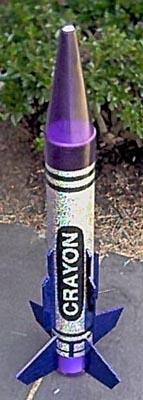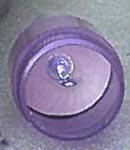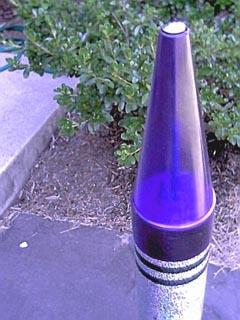Scratch Standard Cray-ARM Original Design / Scratch Built
Scratch - Standard Cray-ARM {Scratch}
Contributed by Dick Stafford
| Manufacturer: | Scratch |
Brief:
Whenever I looked for Ralphco crayon banks at the local toy stores, they always
were out of stock. Recently, however, I stumbled across them while on an
unrelated "mission". I kicked around several ideas on what to build,
and finally decided to build a model that roughly resembled an actual rocket (a
form of "fantasy" scale?). I love the looks of the Standard ARM so I
quickly made my selection. The result is my 38mm Standard Cray-ARM.
 Construction:
Construction:
Components:
1. One Ralphco 4" crayon bank
2. 3/16" plywood for the main fins and nose cone bulkhead
3. 3/16" balsa for the strakes
4. A 1/4" x 9.5" carriage bolt, 2 washers, and 2 nuts
5. Two eye bolts
6. A 12" piece of Giant Leap 38mm flexible phenolic
7. Three 38mm-to-3" centering rings (also from Giant Leap)
8. Two 38mm-to-4" centering rings (ditto)
9. Four inch section of a 3" mailing tube
10. 10' of ¾" braided nylon
11. Two quick links
12. A 1000 lb swivel
13. Two tee-nuts
14. One pair of Matt's nylon rail buttons
15. Nylon chute, picked from my existing stock
Materials:
1. 20 minute epoxy
2. Titebond
3. Thin CA
4. 2-part urethane foam from Giant Leap
5. Hot glue
6. Blue holographic contact paper
 I knew a fair
amount of nose weight would be needed since this rocket was going to be stubby
(less than 10:1 length:width ratio) and the strakes would make its stability
even worse. At a recent launch, I saw a crayon rocket that had a carriage bolt
extending from the tip of the nose through a bulk plate in the middle of the
nose cone. This bolt held the bulk plate against the shoulder where the nose
cone begins its conical transition. This sounded like what I needed so I
borrowed the idea. I made the bulk plate myself and installed an eyebolt for
recovery system attachment. In the nose cone tip, I cut a square hole to accept
the shoulder of the carriage bolt. To insert the bulkhead, I had to bend the
shoulder of the nose cone to an oval shape. I completed the nose cone assembly
by filling the coin slot with hot melt glue.
I knew a fair
amount of nose weight would be needed since this rocket was going to be stubby
(less than 10:1 length:width ratio) and the strakes would make its stability
even worse. At a recent launch, I saw a crayon rocket that had a carriage bolt
extending from the tip of the nose through a bulk plate in the middle of the
nose cone. This bolt held the bulk plate against the shoulder where the nose
cone begins its conical transition. This sounded like what I needed so I
borrowed the idea. I made the bulk plate myself and installed an eyebolt for
recovery system attachment. In the nose cone tip, I cut a square hole to accept
the shoulder of the carriage bolt. To insert the bulkhead, I had to bend the
shoulder of the nose cone to an oval shape. I completed the nose cone assembly
by filling the coin slot with hot melt glue.
 For the fin design,
I entered the crayon bank into Rocksim and started with a fin set from my NCR
Archer. I then played with the fin dimensions until they looked 'right'. Since
I wanted through-the-wall fins and they barely extended to the crayon bank's
cardboard tube, I was worried about the support that the rear plastic cap could
provide. This worry was exacerbated when I knocked over one of my crayon banks,
shattering its cap. This lead me to the construction of an inner, 3"
diameter tube structure within the end cap.
For the fin design,
I entered the crayon bank into Rocksim and started with a fin set from my NCR
Archer. I then played with the fin dimensions until they looked 'right'. Since
I wanted through-the-wall fins and they barely extended to the crayon bank's
cardboard tube, I was worried about the support that the rear plastic cap could
provide. This worry was exacerbated when I knocked over one of my crayon banks,
shattering its cap. This lead me to the construction of an inner, 3"
diameter tube structure within the end cap.
To build the fin can, I started by cutting a hole in the end cap to accept the 38mm tube. I then placed a 3" centering ring so that the motor tube would extend through the cap, just far enough to accept another 3" centering ring on the outside. Thus, the end of the plastic cap would be sandwiched between the two centering rings. Using epoxy for all wood-phenolic joints and Titebond for all wood-cardboard joints, I built an inner fin support tube, which extends the length of the plastic end cap (including its shoulder). The fin tabs extend through the plastic cap and this inner tube, to the motor mount. For added support, I filled the inner tube with 2-part urethane foam. Unfortunately, I didn't do a good job sealing the fin can, so some of the foam escaped into the plastic end cap. Luckily, this isn't too noticeable. I slid on the rear centering ring and drilled holes through both rear rings to accommodate the motor retention bolts. The outer ring was then removed, tee-nuts were installed, and the ring was epoxied back on. Two 4" centering rings completed the fin can assembly. These had to be sanded to fit since the crayon bank ID is slightly smaller than a standard 4" tube. An eye bolt was also mounted in the forward ring.
The recovery harness includes a 10' length of tubular nylon, a 1000 lb. swivel, and two quick-links. Loops were made in the ends of the tubular by folding it over, wrapping it with cloth fishing line, and gluing it with both CA and epoxy. This technique was documented by Giant Leap in an old HPR magazine and works well.
Finishing:
One nice thing about crayon rockets as the bulk of the finishing is done for
you. Since the body has a holographic finish, I decided I'd finish the fins
using holographic contact paper. I would have liked purple paper to match the
nose cone and end cap, but couldn't find it. Instead, I picked up some blue
holographic contact paper on sale at a craft store.
Flight:
After completing the design in RockSim and adjusting the CG and weight to match
the as-built rocket, I found that it would be stable on an H123 without
additional nose weight. The sim also told me that a short, 6-second delay would
be about right. I launched the Standard Cray-ARM on this engine at the Delaware
Tripoli launch on October 21, 2001. The flight was straight and fast. For
recovery, I used worm-bed wadding, a Giant Leap Kevlar®
heat shield, and the 48" chute from my
DG&A
Lazarus. Recovery was flawless. Well, almost. Once on the ground, the
rocket was pulled along and quite a bit of dirt was forced into the tube. This
made cleaning the casing a bit more work, but no big deal.
Summary:
The Standard Cray-ARM project was highly successful. The rocket is somewhat
unique and looks great (at least in my unbiased opinion). The design worked out
nicely with the long carriage bolt providing enough nose weight for the rocket
to be stable. Just before I placed the Standard Cray-ARM on the pad, Ray Halm
interviewed me for the video he is making on the 3-day Rhodesdale launch. Man,
am I anxious to see if the Standard Cray-ARM makes it past the editing process.
Either way, Ray has sold a tape!
 |
 |